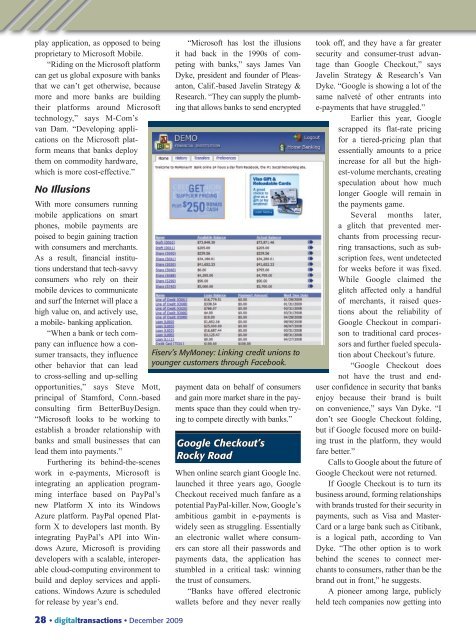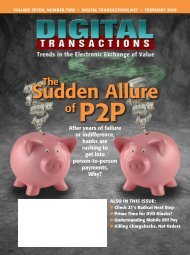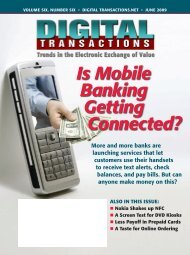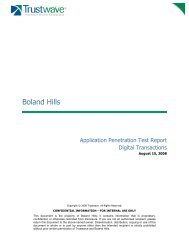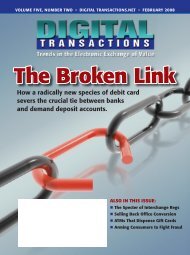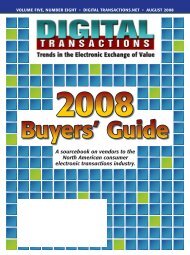Corporate America Discovers Payments - Digital Transactions
Corporate America Discovers Payments - Digital Transactions
Corporate America Discovers Payments - Digital Transactions
You also want an ePaper? Increase the reach of your titles
YUMPU automatically turns print PDFs into web optimized ePapers that Google loves.
play application, as opposed to beingproprietary to Microsoft Mobile.“Riding on the Microsoft platformcan get us global exposure with banksthat we can’t get otherwise, becausemore and more banks are buildingtheir platforms around Microsofttechnology,” says M-Com’svan Dam. “Developing applicationson the Microsoft platformmeans that banks deploythem on commodity hardware,which is more cost-effective.”No IllusionsWith more consumers runningmobile applications on smartphones, mobile payments arepoised to begin gaining tractionwith consumers and merchants.As a result, financial institutionsunderstand that tech-savvyconsumers who rely on theirmobile devices to communicateand surf the Internet will place ahigh value on, and actively use,a mobile- banking application.“When a bank or tech companycan influence how a consumertransacts, they influenceother behavior that can leadto cross-selling and up-sellingopportunities,” says Steve Mott,principal of Stamford, Conn.-basedconsulting firm BetterBuyDesign.“Microsoft looks to be working toestablish a broader relationship withbanks and small businesses that canlead them into payments.”Furthering its behind-the-sceneswork in e-payments, Microsoft isintegrating an application programminginterface based on PayPal’snew Platform X into its WindowsAzure platform. PayPal opened PlatformX to developers last month. Byintegrating PayPal’s API into WindowsAzure, Microsoft is providingdevelopers with a scalable, interoperablecloud-computing environment tobuild and deploy services and applications.Windows Azure is scheduledfor release by year’s end.“Microsoft has lost the illusionsit had back in the 1990s of competingwith banks,” says James VanDyke, president and founder of Pleasanton,Calif.-based Javelin Strategy &Research. “They can supply the plumbingthat allows banks to send encryptedFiserv’s MyMoney: Linking credit unions toyounger customers through Facebook.payment data on behalf of consumersand gain more market share in the paymentsspace than they could when tryingto compete directly with banks.”Google Checkout’sRocky RoadWhen online search giant Google Inc.launched it three years ago, GoogleCheckout received much fanfare as apotential PayPal-killer. Now, Google’sambitious gambit in e-payments iswidely seen as struggling. Essentiallyan electronic wallet where consumerscan store all their passwords andpayments data, the application hasstumbled in a critical task: winningthe trust of consumers.“Banks have offered electronicwallets before and they never reallytook off, and they have a far greatersecurity and consumer-trust advantagethan Google Checkout,” saysJavelin Strategy & Research’s VanDyke. “Google is showing a lot of thesame naïveté of other entrants intoe-payments that have struggled.”Earlier this year, Googlescrapped its flat-rate pricingfor a tiered-pricing plan thatessentially amounts to a priceincrease for all but the highest-volumemerchants, creatingspeculation about how muchlonger Google will remain inthe payments game.Several months later,a glitch that prevented merchantsfrom processing recurringtransactions, such as subscriptionfees, went undetectedfor weeks before it was fixed.While Google claimed theglitch affected only a handfulof merchants, it raised questionsabout the reliability ofGoogle Checkout in comparisonto traditional card processorsand further fueled speculationabout Checkout’s future.“Google Checkout doesnot have the trust and enduserconfidence in security that banksenjoy because their brand is builton convenience,” says Van Dyke. “Idon’t see Google Checkout folding,but if Google focused more on buildingtrust in the platform, they wouldfare better.”Calls to Google about the future ofGoogle Checkout were not returned.If Google Checkout is to turn itsbusiness around, forming relationshipswith brands trusted for their security inpayments, such as Visa and Master-Card or a large bank such as Citibank,is a logical path, according to VanDyke. “The other option is to workbehind the scenes to connect merchantsto consumers, rather than be thebrand out in front,” he suggests.A pioneer among large, publiclyheld tech companies now getting into28 digitalDecember 2009


